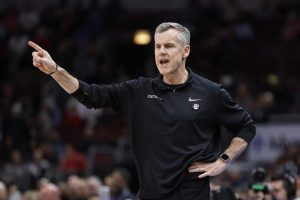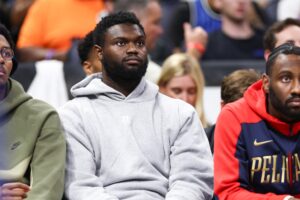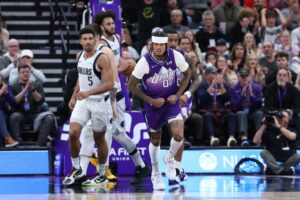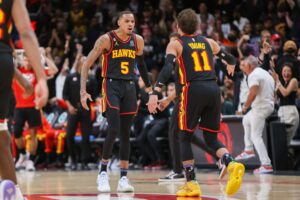In 1998, the Dallas Mavericks drafted little known Dirk Nowitzki with the 9th overall pick. A year later, the San Antonio Spurs picked yet another foreigner with their 57th pick—Manu Ginobili.
These two players would soon prove their worth in the NBA. Nowitzki went on to become the greatest player to put on a Mavericks jersey. Ginobili, on the other hand, won four NBA Championships for the Spurs after serving the team for two decades.
The stardom of Ginobili and Nowitzki inspired a host of other international basketball players to join the NBA: the Antetokounmpo brothers, Luka Doncic, Ben Simmons and Pau Gasol, to name a few.
Meanwhile, the NBA has been trying to expand beyond the US. But before it wins over the world, the league wants to become the second biggest sport in the UK. Is British basketball succeeding?
The Growth of British Basketball
Yearly Fixtures Since 1993
Popularizing basketball in the UK isn’t a new idea. The league hosted its first game in England in 1993. The game, played at the Wembley Arena, featured the Atlanta Hawks and the Orlando Magic in pre-season friendlies.
Two years later, the NBA sent the Houston Rockets to face off against European teams. The idea wasn’t exactly a success and the league didn’t return to England until 2007. This time, the Boston Celtics were facing the Minnesota Timberwolves at the O2 arena.
The NBA loved the reception its games received in London. And, as a result, it organized more friendlies at the same venues within three years. Fast forward to 2011 and the league took things a notch higher.
Instead of friendlies, the National Basketball Association would now feature one league game in London every year. The league took a break in 2012 but brought back the games from 2013 to 2019.
Number Two Popular Sport Among Kids
When Adam Silver said his plan was to elevate British basketball into the number two sport (behind football), he wasn’t exaggerating. Basketball is now the second most played sport by children between the ages of 11 and 15 years, according to a study by the Department of Culture and Media Sport.
Roughly 54 percent of kids in the UK prefer to play football in their free time. This is good news to all the fans of the beautiful game. But, if you’re one of the people who’ve always thought basketball would never hold foot in Britain, you’ll be surprised to learn the American sport is now more popular than cricket.
Basketball has a popularity score of 32 percent while cricket follows at 29 percent. Basketball is particularly popular among ethnic minorities. This doesn’t surprise researchers, though. The Reach & Teach Network, for example, has been targeting inner-city kids and training them in basketball for years. Now, the organization has 7,000 trained kids in the UK.
Another organization, basketball academy for women, grew into the biggest basketball club for girls within two years of starting in 2013. These small organizations, although underfunded, have been spreading basketball rapidly, proving there’s a growing interest in the sport.
The Growth of British Basketball
British basketball has come a long way since its launch in 1987. Back then, critics believed the sport would collapse amid stiff competition from football, cricket, netball, golf and rugby. Despite that, the British Basketball League skyrocketed in the 1990’s, attracting sponsors left, right and center.
Sadly, one of the biggest potential sponsors for the league, ITV Digital, collapsed in the early 2000’s. The BBL lost out over $20 million in potential funding. And the result was that some BBL franchises collapsed.
After nearly a decade of losing popularity in the UK, British basketball began training traction once again. Starting in 2012, the BBL started to sellout stadiums. Sponsors came back and the sport was reintroduced on betting websites.
Today, you can join any of the best basketball betting sites listed at bestbettingsites.co.uk. And, you’re assured of finding betting markets for the British Basketball League. The sportsbooks also support the NBA and international basketball tournaments.
Attracting European Talent
During a 2015 press conference, Adam Silver made it clear that the NBA was interested in attracting European talent to North America. Indeed, some of the biggest superstars in the NBA are players not born in the US.
Giannis Antetokounmpo, who recently led the Milwaukee Bucks to their first NBA Championship in 50 years, is of Greek nationality. The 26-year-old is also a two-time Most Valuable Player award winner, a five-time all-star, and an NBA Finals Most Valuable Player.
Antetokounmpo won his Most Valuable Player awards back-to-back in 2019 and 2020. Interestingly, the 2021 Most Valuable Player award also went to an international player, Nikola Jokic of Serbia. Dirk Nowitzki, although retired, is the other international player to have bagged the prestigious award.
Frequent Stadium Sellouts
If you need more evidence that basketball is gaining traction in England, look no further than during major tournaments. It doesn’t matter which competition is taking place. It could be an NBA match or a major game in the BBL.
In nearly all cases, tickets sellout within a couple of hours. It’s evident there’s a huge demand for quality basketball in the UK. People are constantly willing to show up for basketball tournaments.
Unfortunately, the UK government does little to support the sport. The NBA has 60 employees at its London offices. But the British government has been underfunding the sport for years. A case in point: UK sport cut basketball funding from £9 million to £2 million in 2013 but it didn’t feel the country could compete at a world-class level in the 2016 and 2020 Olympic games.
Interestingly, the country spent millions in rowing, sailing and equestrian before the 2012 London Olympics. That, of course, raised concern that Britain has been neglecting a much bigger sport for smaller sports.
The Future of British Basketball
British Basketball overcame a lot of adversity before growing into the competitive sport it is today. At one time, people believed an American sport wouldn’t grow popular in the UK. But now, it’s so popular that major tournaments sellout tickets within an hour.
Main Photo






